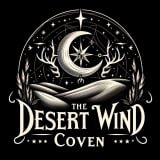Copyright © 1983 - 2009 by Mike Nichols
It took more than twenty years before I first ran across the notion that Witchcraft and Wicca were not the same thing. I don't remember where I first read it, but I do remember feeling bemused at such an assertion, and assumed the author had failed to do adequate research into the origins of the word "witch". I also assumed I'd heard the last of it. I assumed wrong!
Over the years, I've seen this sentiment turning up more and more, in conversations, in online discussions and websites, and even in published works on Witchcraft. It is often stated with such conviction that one might conclude it is the very least one needs to know on the subject. The author is usually at pains to convey the distinction that Wicca designates a religion, whereas Witchcraft is merely the practice of magic. In recent years, I have come across three further amplifications: The first is that some groups identify themselves as practicing Wicca exclusively, as a religious or spiritual path. As such, they do not hold with the more "debased" practice of Witchcraft or other magic! The second is that some groups claim that Witchcraft predates Wicca (which they apparently believe was invented by Gerald Gardner) and is therefore more "authentic". The third is that only practitioners who are in a lineal descent from Gardner or one of his covens may use the word Wicca to describe their tradition. All others would have to default to the word Witchcraft for their praxis.
Needless to say (or is it?), this so-called "distinction" between Witchcraft and Wicca came as a huge surprise, and a bit of a shock, to those of us who embarked upon this path back in the 1960s and '70s. Although the term Wicca was known (as the origin of the word Witch), it was seldom used. We were Witches, pure and simple. And we practiced Witchcraft, or sometimes "the Craft", or (based on a popular but incorrect etymology) "the Craft of the Wise", or "the Old Religion". But nobody practiced "Wicca". Even Gardnerians called themselves Witches, typically modified by others to Gardnerian Witches. On the rare occasion when the word Wicca did come up, it was used interchangeably with Witchcraft. Most often, it was when someone was trying to dodge the issue. Potential father-in-law: "So what is this weird cult my daughter says you're into?" Boyfriend (blood draining from face): "Uhhhhh..... OH! I think you must mean Wicca? yeah, that's it... Say, how about those Dodgers?"
The attempt to make a distinction between the spiritual, devotional, or celebrational side of our religion, and the more utilitarian use of ritual and ceremony to effect desired changes in our world, would never have occurred to us. One of the principle tenets of Witchcraft is that the spiritual and material sides of life interpenetrate one another and cannot be meaningfully separated. To attempt to do so is to encourage the sort of Neo-Platonic dualism that has bedeviled our Western society for centuries and led to, among other things, the demonizing of sex and the body, and disdain for our environment. In fact, any attempt to separate Wicca from Witchcraft, the religious practice from the magical practice, is not only historically misguided, but politically dangerous. It plays us directly into the hands of our detractors. But I am getting ahead of myself.
The first question to tackle is where this idea came from. It clearly wasn't there in the 1960s. Nor can it be found in the writings of the 1970s. In fact, an unambiguous reference to this idea does not occur until the late1980s! So the first thing to realize is that this notion is of far more recent vintage than most people would believe. Books about Witchcraft (such as Sybil Leek's Diary of a Witch, in which she speaks of Witchcraft as a religion) began to be published frequently from the 1960s onward, yet they used the word Wicca quite sparingly. In fact, the first popular book to use the word Wicca in the title did not appear until 1988! This was Scott Cunningham's Wicca: A Guide for the Solitary Practitioner. Had this title appeared in bookstores in the '60s or '70s, the most likely reaction, even from Witches themselves, would have been "Huh?!" They would have recognized the word, but would have wondered why such an obscure term should have been preferred to a common one. Not coincidentally, Scott Cunningham was among the first writers to claim there is a difference between Wicca and Witchcraft.

